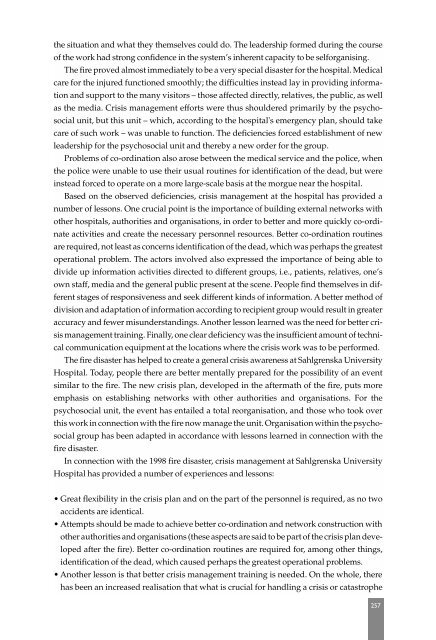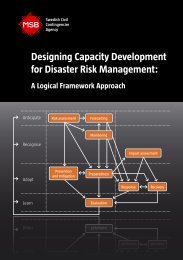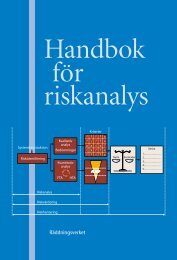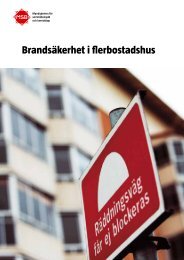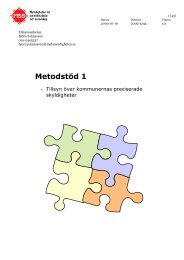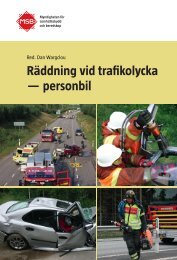Göteborgsbranden 1998 - Myndigheten för samhällsskydd och ...
Göteborgsbranden 1998 - Myndigheten för samhällsskydd och ...
Göteborgsbranden 1998 - Myndigheten för samhällsskydd och ...
Create successful ePaper yourself
Turn your PDF publications into a flip-book with our unique Google optimized e-Paper software.
the situation and what they themselves could do. The leadership formed during the course<br />
of the work had strong confidence in the system’s inherent capacity to be selforganising.<br />
The fire proved almost immediately to be a very special disaster for the hospital. Medical<br />
care for the injured functioned smoothly; the difficulties instead lay in providing information<br />
and support to the many visitors – those affected directly, relatives, the public, as well<br />
as the media. Crisis management efforts were thus shouldered primarily by the psychosocial<br />
unit, but this unit – which, according to the hospital's emergency plan, should take<br />
care of such work – was unable to function. The deficiencies forced establishment of new<br />
leadership for the psychosocial unit and thereby a new order for the group.<br />
Problems of co-ordination also arose between the medical service and the police, when<br />
the police were unable to use their usual routines for identification of the dead, but were<br />
instead forced to operate on a more large-scale basis at the morgue near the hospital.<br />
Based on the observed deficiencies, crisis management at the hospital has provided a<br />
number of lessons. One crucial point is the importance of building external networks with<br />
other hospitals, authorities and organisations, in order to better and more quickly co-ordinate<br />
activities and create the necessary personnel resources. Better co-ordination routines<br />
are required, not least as concerns identification of the dead, which was perhaps the greatest<br />
operational problem. The actors involved also expressed the importance of being able to<br />
divide up information activities directed to different groups, i.e., patients, relatives, one’s<br />
own staff, media and the general public present at the scene. People find themselves in different<br />
stages of responsiveness and seek different kinds of information. A better method of<br />
division and adaptation of information according to recipient group would result in greater<br />
accuracy and fewer misunderstandings. Another lesson learned was the need for better crisis<br />
management training. Finally, one clear deficiency was the insufficient amount of technical<br />
communication equipment at the locations where the crisis work was to be performed.<br />
The fire disaster has helped to create a general crisis awareness at Sahlgrenska University<br />
Hospital. Today, people there are better mentally prepared for the possibility of an event<br />
similar to the fire. The new crisis plan, developed in the aftermath of the fire, puts more<br />
emphasis on establishing networks with other authorities and organisations. For the<br />
psychosocial unit, the event has entailed a total reorganisation, and those who took over<br />
this work in connection with the fire now manage the unit. Organisation within the psychosocial<br />
group has been adapted in accordance with lessons learned in connection with the<br />
fire disaster.<br />
In connection with the <strong>1998</strong> fire disaster, crisis management at Sahlgrenska University<br />
Hospital has provided a number of experiences and lessons:<br />
• Great flexibility in the crisis plan and on the part of the personnel is required, as no two<br />
accidents are identical.<br />
• Attempts should be made to achieve better co-ordination and network construction with<br />
other authorities and organisations (these aspects are said to be part of the crisis plan developed<br />
after the fire). Better co-ordination routines are required for, among other things,<br />
identification of the dead, which caused perhaps the greatest operational problems.<br />
• Another lesson is that better crisis management training is needed. On the whole, there<br />
has been an increased realisation that what is crucial for handling a crisis or catastrophe<br />
257


